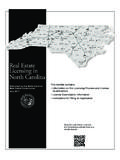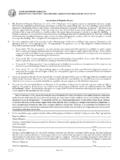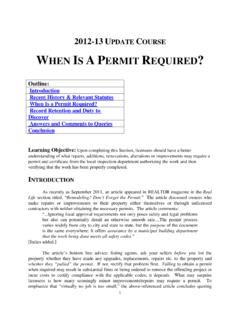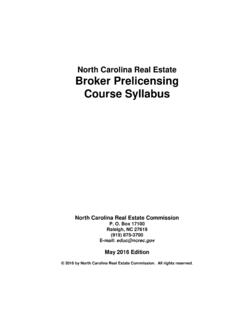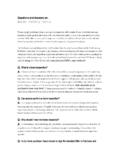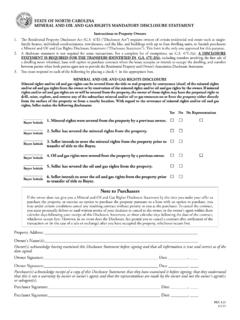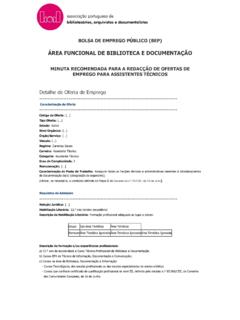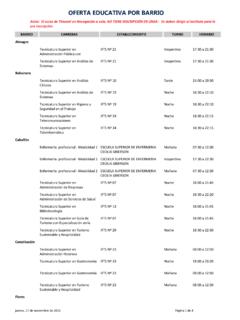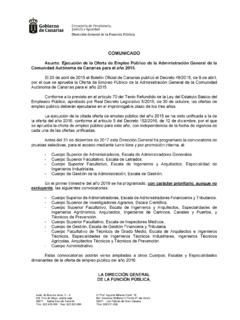Transcription of Questions and Answers on: O F F E R A N D A C C E …
1 Questions and Answers on: O F F E R A N D A C C E P T A N C E The purchase contract is the most important document in any real estate sale. It must reflect the entire agreement between the buyer and seller. This brochure examines issues arising during contract negotiations in residential real estate sales transactions. In particular, it focuses on offer and acceptance : the process by which a buyer and seller create a binding legal contract. This process typically begins when a prospective buyer makes an offer. Then, the seller either accepts it, rejects it, or rejects it and makes a counteroffer.
2 Then the buyer has the same options ( , accept, reject without making a counteroffer, or reject with a counteroffer). When one party accepts the other party s offer or counteroffer, including communicating that acceptance to the offering party, a purchase contract is created. Any misunderstandings concerning offer and acceptance can result in serious legal and financial consequences for the buyer and seller. Therefore, it is imperative that you carefully read and understand the entire purchase contract and that you consult an attorney if you do not understand any issues regarding it before you enter into a binding contract.
3 The Questions raised in this publication are of special concern to real estate purchasers. Consequently, they are posed from the standpoint of the purchaser. Q: I have found a home I am interested in buying. How do I make an offer to purchase it? A: Typically, you will complete a standardized offer to purchase form with the help of a real estate broker probably a buyer agent. This form will express the terms of the purchase (purchase price, closing date, etc.) that you are proposing to the seller. The most common residential offer form in North Carolina is the Offer to Purchase and Contract (Form No.)
4 2-T), jointly approved by the Bar Association and NC REALTORS . Many standard addenda forms also are available to add provisions of special importance to the parties. Your real estate broker may have a variety of these forms, but if a standard, preprinted form is not available covering the specific terms of your offer, you should consult a private attorney to draft an appropriate document for your use. Real estate brokers are not permitted to draft contracts or even special provisions such as contingencies. Q: Does my offer to purchase have to be in writing?
5 A: To be enforceable, real estate sales contracts in North Carolina must be in writing. Since only written offers may become binding contracts, your offer should be in writing and signed. Q: What should be in my offer? A: At a minimum, your offer must clearly identify you and the seller, and state the sales price, and closing date and all of the terms agreed upon by you and the seller. It must also contain an adequate legal description of the property (for example, a reference to a recorded plat map or deed) a street address alone is not sufficient.
6 There are many other important provisions you should consider. For example, to ensure that items or features of the property you have seen in advertisements or MLS information are included in the sale, you or your broker should list them in your offer. Any form contract supplied to you by a real estate broker must include at least nineteen separate required provisions. The standard form Offer to Purchase and Contract includes all these and many more. Q: Must my offer include earnest money? A: Earnest money is not required to make a binding real estate sales contract.
7 However, it is a common practice for a buyer to include it with an offer because it shows the buyer s good faith, demonstrates some available cash, and makes it more likely that the seller will accept the offer. Real estate brokers must deposit earnest money checks no later than three banking days after acceptance of the offer, but they may be deposited at any time after receipt. So, be sure your earnest money check is good at the time you write it. (For more information on earnest money deposits, see the Commission s brochure, Questions and Answers on: Earnest Money Deposits.)
8 Q: How will my offer be communicated to the seller? A: The real estate broker with whom you are working must deliver it to the seller s broker or directly to the seller if the seller has no broker. The seller s broker must present it to the seller. Q: How does acceptance occur? A: To accept your offer, the seller must sign it without making any changes. Until you or your broker have been notified that the seller has signed your offer, you can withdraw it at any time even if you have given the seller a deadline by which he or she must respond. Q: Once the seller has signed my offer, does it become a contract?
9 A: No. It does not become a binding contract until the seller (or seller s broker) has notified you (or your broker) that the seller has signed it. If your broker informs you that the seller has verbally accepted or will accept your offer but has not yet signed it, there is no enforceable contract. Q: How will I be notified of the seller s acceptance of my offer? A: Unless the contract specifies the manner in which acceptance is to be given, it may be communicated in a variety of ways including orally by the seller or seller s broker, by personal delivery of the signed offer, mail, facsimile (fax) or electronic mail.
10 If you re told that the seller has accepted your offer, ask whether the seller has signed it, and ask for a signed copy of the contract. Your real estate broker must furnish it to you. Q: What if the seller changes my offer in some way and then signs it? A: If the seller makes any changes in your original offer, the offer is rejected and cannot later be accepted. By making changes to the original offer, the seller is, in fact, making a counteroffer to you which you can either accept, reject without making a counteroffer, or reject and make your own counteroffer.
